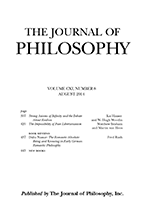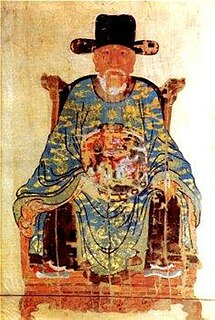Related Research Articles
No true Scotsman, or appeal to purity, is an informal fallacy in which one attempts to protect their universal generalization from a counterexample in an ad hoc fashion by tautologically excluding the counterexample. Rather than abandoning the universal generalization or providing evidence that would disqualify the counterexample, this fallacy involves offering a modified generalization to definitionally exclude the desired specific case and counterexamples like it by appeal to rhetoric as opposed to an objective criterion. This rhetoric takes the form of emotionally charged but nonsubstantive purity platitudes such as "true, pure, genuine, authentic, real", etc.
The problem of other minds is a philosophical problem traditionally stated as the following epistemological question: Given that I can only observe the behavior of others, how can I know that others have minds? It is a major issue of the philosophical idea known as solipsism: the notion that for any person only one's own mind is known to exist. Solipsism maintains that no matter how sophisticated someone's behavior is, behavior on its own does not guarantee the presence of mentality.

Rudolf Carnap was a German-language philosopher who was active in Europe before 1935 and in the United States thereafter. He was a major member of the Vienna Circle and an advocate of logical positivism. He is considered "one of the giants among twentieth-century philosophers."

Christian philosophy is the set of philosophical ideas initiated by Christians from the 2nd century to the present day.
The perennial philosophy, also referred to as perennialism and perennial wisdom, is a perspective in philosophy and spirituality that views all of the world's religious traditions as sharing a single, metaphysical truth or origin from which all esoteric and exoteric knowledge and doctrine has grown.
Vedanta is one of the six (āstika) schools of Hindu philosophy. Literally meaning "end of the Vedas", Vedanta reflects ideas that emerged from, or were aligned with, the speculations and philosophies contained in the Upanishads, specifically, knowledge and liberation. Vedanta contains many sub-traditions on basis of a common textual connection called the Prasthanatrayi: the Upanishads, the Brahma Sutras and the Bhagavad Gita.

Continental philosophy is a set of 19th- and 20th-century philosophical traditions from mainland Europe. This sense of the term originated among English-speaking philosophers in the second half of the 20th century, who used it to refer to a range of thinkers and traditions outside the analytic movement. Continental philosophy includes German idealism, phenomenology, existentialism, hermeneutics, structuralism, post-structuralism, deconstruction, French feminism, psychoanalytic theory, and the critical theory of the Frankfurt School as well as branches of Freudian, Hegelian and Western Marxist views.

Nicholas Rescher is a German-American philosopher, polymath, and author, teaching at the University of Pittsburgh. He is the Chairman of the Center for Philosophy of Science and has formerly served as Chairman of the Philosophy Department.

Jacques Maritain was a French Catholic philosopher. Raised Protestant, he was agnostic before converting to Catholicism in 1906. An author of more than 60 books, he helped to revive Thomas Aquinas for modern times, and was influential in the development and drafting of the Universal Declaration of Human Rights. Pope Paul VI presented his "Message to Men of Thought and of Science" at the close of Vatican II to Maritain, his long-time friend and mentor. The same pope had seriously considered making him a lay cardinal, but Maritain rejected it. Maritain's interest and works spanned many aspects of philosophy, including aesthetics, political theory, philosophy of science, metaphysics, the nature of education, liturgy and ecclesiology.
Bastiaan Cornelis van Fraassen is a Dutch-American philosopher noted for his seminal contributions to philosophy of science and epistemology. He is a Distinguished Professor of Philosophy at San Francisco State University and the McCosh Professor of Philosophy Emeritus at Princeton University.

The Milesian school was a school of thought founded in the 6th century BC. The ideas associated with it are exemplified by three philosophers from the Ionian town of Miletus, on the Aegean coast of Asia Minor: Thales, Anaximander, and Anaximenes. They introduced new opinions contrary to the prevailing belief of how the world was organized, in which natural phenomena were explained solely by the will of anthropomorphized gods. The Milesians conceived of nature in terms of methodologically observable entities, and as such was one of the first truly scientific philosophies.

Curt John Ducasse was a French-born American philosopher who taught at the University of Washington and Brown University.

Philosophical anthropology, sometimes called anthropological philosophy, is a discipline dealing with questions of metaphysics and phenomenology of the human person.

The Journal of Philosophy is a monthly peer-reviewed academic journal on philosophy, founded in 1904 at Columbia University. Its stated purpose is "To publish philosophical articles of current interest and encourage the interchange of ideas, especially the exploration of the borderline between philosophy and other disciplines." Subscriptions and online access are managed by the Philosophy Documentation Center.

Theodore "Ted" Michael Drange is a philosopher of religion and Professor Emeritus at West Virginia University, where he taught philosophy from 1966 to 2001.

Philosophy is the study of general and fundamental questions, such as those about reason, existence, knowledge, values, mind, and language. Such questions are often posed as problems to be studied or resolved. The term was probably coined by Pythagoras. Philosophical methods include questioning, critical discussion, rational argument, and systematic presentation.
David J. Kalupahana (1936–2014) was a Buddhist scholar from Sri Lanka. He was a student of the late K.N. Jayatilleke, who was a student of Wittgenstein. He wrote mainly about epistemology, theory of language, and compared later Buddhist philosophical texts against the earliest texts and tried to present interpretations that were both historically contextualised and also compatible with the earliest texts, and in doing so, he encouraged Theravadin Buddhists and scholars to reevaluate the legitimacy of later, Mahayana texts and consider them more sympathetically.
Irving Singer was an American professor of philosophy who was on the faculty of the Massachusetts Institute of Technology for 55 years and wrote over 20 books. He was the author of books on various topics, including cinema, love, sexuality, and the philosophy of George Santayana. He also wrote on the subject of film, including writings about the work of film directors Ingmar Bergman, Alfred Hitchcock.

Vietnamese philosophy includes both traditional Confucian philosophy, Vietnamese local religious traditions, and later philosophy introducing French, Marxist, Catholic and other influences.